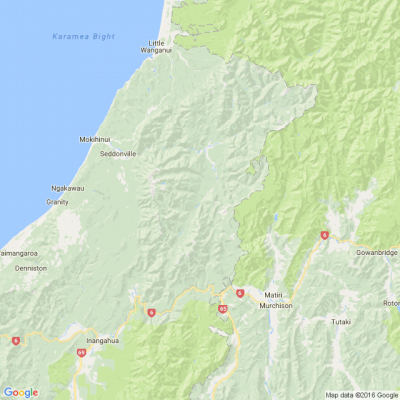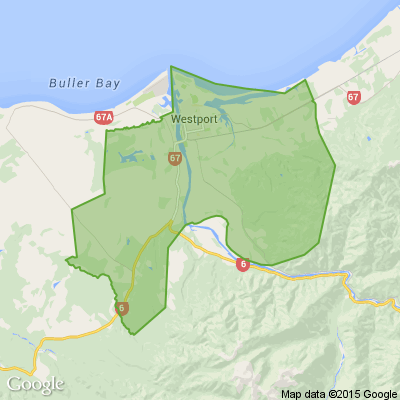West Coast to review who pays for flood protection
By local democracy reporter Brendon McMahon:
West Coasters could pay a universal rate for flood protection assets in future - regardless of where they live.
The West Coast Regional Council will consider various options as part of a rating district review due by 2027.
Currently, 23 special rating districts pay targeted rates to maintain river stop banks or coastal protection walls in their area.
The rating district setup, on behalf of local communities, includes the three main towns of Greymouth, Westport, and Hokitika, the tourist hotspots of Punakaiki and Franz Josef, and multiple farming communities along the region's 650km length.
A report to councillors for the 2024-34 long-term plan (LTP) said the rating district review was included in consultation to indicate it "was required".
The way individual rating districts were founded had resulted in "a range of different rating scenarios" and constitutional arrangements.
It left "a level of complexity and inefficiency" in the gambit of what each rating area was for.
Haast submitter Vance Boyd said the benefit of rating districts was viewed differently within particular communities and it was a potentially divisive issue.
At the same time small communities struggled to raise the necessary capital to add protection.
Boyd said the council should rate across "the whole district" rather than relying on individual rating for particular areas.
Councillor Peter Ewen said the "bigger picture" of wider community benefit from protection assets had to be highlighted.
This was relevant for those outside a particular rating area who gained the benefit of accessing a service centre like Greymouth for example.
"The whole community benefits from those rating districts, it doesn't matter where they are," he said.
Long-time Westport surveyor Chris Coll also said the special rating district net should be thrown for the widest community benefit.
He estimated up to 15% of the town of Westport could fall "outside" the projected flood protection scheme for his area, yet all residents in the area would benefit from it.
Council chief executive Darryl Lew noted Westport was "a greenfield scheme" at this point and identifying the tangible benefit was yet to be worked through.
But the question of direct and indirect benefit would be assessed as the scheme design was finalised in the next couple of months.
Lew also noted Southland had now gone to "one targeted rate for all its special rating districts".
Councillor Brett Cummings said having one targeted rate might impact council's ability to tap external funding for new protection projects and that needed investigation.
Ewen noted one submitter viewed a universal approach to special rating areas as potentially penalising them for choosing to live "in less risky areas".
However, it was always on property buyers to be aware of the risk in the first place, he said.
James Sutherland, for Federated Farmers, said the proposed review should go out for full consultation given 6500 ratable properties across the region were not currently within a special rating area.
The report noted rating district asset management as "crucial to support the region" because it:
* protects economic productivity,
* reduces natural hazard risk to communities,
* promotes safety and wellbeing.
During formal LTP deliberations, Cummings said the review was not just about rates but the constitution of the rating districts.
Lew agreed, saying a lot of the submitters had focused only on benefit.
But all aspects of the current rating schemes needed to be reviewed including that some were rated based on land value, others on capital value.
The question of council back-office costs for individual districts also had to be assessed, he said.
Poll: Should the government levy industries that contribute to financial hardship?
As reported in the Post, there’s a $30 million funding gap in financial mentoring. This has led to services closing and mentors stepping in unpaid just to keep helping people in need 🪙💰🪙
One proposed solution? Small levies on industries that profit from financial hardship — like banks, casinos, and similar companies.
So we want to hear what you think:
Should the government ask these industries to contribute?

-
60% Yes, supporting people is important!
-
25.7% No, individuals should take responsibility
-
14.3% ... It is complicated
A Neighbourly Riddle! Don’t Overthink It… Or Do?😜
Do you think you know the answer? Simply 'Like' this post if you know the answer and the big reveal will be posted in the comments at 2pm on the day!
If you multiply this number by any other number, the answer will always be the same. What number is this?

Have you got New Zealand's best shed? Show us and win!
Once again, Resene and NZ Gardener are on the hunt for New Zealand’s best shed! Send in the photos and the stories behind your man caves, she sheds, clever upcycled spaces, potty potting sheds and colourful chicken coops. The Resene Shed of the Year 2026 winner receives $1000 Resene ColorShop voucher, a $908 large Vegepod Starter Pack and a one-year subscription to NZ Gardener. To enter, tell us in writing (no more than 500 words) why your garden shed is New Zealand’s best, and send up to five high-quality photos by email to mailbox@nzgardener.co.nz. Entries close February 23, 2026.









 Loading…
Loading…





